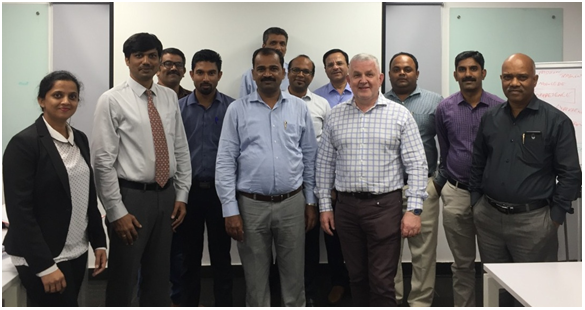The COVID-19 pandemic has acted as a catalyst for change within the professional landscape. This will impact business transformation strategies necessary to upgrade the conventional ways in which employer-employee and supplier-customer relationships are considered.
Along with the onset of the pandemic, indicators, and traditional ways of employee engagement in the workplace, monitoring service providers, relationships with suppliers and performance management of the businesses have all been impacted and affected the organisational and corporate environment. Organisations have needed to anticipate these factors quickly and implemented revised processes and approaches without hampering the overall productivity.

Among all these changes, the role of Facility Management has become increasingly prominent, emerging from the shadows top being a highly visible instigator of change to organizational culture, introducing quality, safe practises, talent development, sustainability, innovation, technology, and analytics.

The biggest consequence of the pandemic was shifting to work from home. The corporate culture’s design must anticipate this change in an agile manner, along with ensuring continued productivity.
The challenge is to motivate the employees to achieve the same results and ensuring the employers to acclaim the effort.
The integration of the work from home culture into the organisation was perceived as an opportunity to further develop the concept of homeworking including the associated challenges. Quality factors are now being appreciated as much as quantitative factors. Previously, working hours were important, quality and results become fundamental pioneers to categorise a task as ‘productive’.
Employees have essentially been doing the same work but under different environments and different circumstances. This leads to a potential question — ‘How the performance of employees and suppliers can be measured and quantified by an organisation?’ Thus, strategic facility management comes to the fore!
Alternatively, intelligent, and data-driven methods should be exploited to establish a connection will have to be adopted to understand the changing organizational needs of companies and their suppliers — which should ensure productive business continuity and proliferate good supplier-customer relationships.
Health and Wellness sector is gaining increasing importance.
Wellness initiatives are directly proportional to the bottom line of the company as productivity can be improved by around 10%.
Hence, organisations are now understanding the importance or engaging trained and professional facility managers to drive hygiene initiatives where safety is gaining more importance for everyone. FM providers along with their clients are working on devising tailored soft services enhancing the experience of employees and reassuring their safety simultaneously.
Roadmaps for aligning and organising the phased return of employees to the workplace.

‘Work from home’ culture’s functionalities are unique to an organisation. Having flexibility and prolonged working hours are obvious advantages. Minimum social interaction and dissemination of information from executives to managers to employees, including proposed differences in expectations, and the lack of alignment of ideas was considerably holding back the execution and expedition of services.
Now, facility managers are required to carefully devise hybrid and balanced roadmaps to enforce the re-entry of employees in the workplace. Keeping in mind maximum capacity per space (as decided by the government guidelines), accordingly the building plans should be devised where efficient use of resources at the office is practised. The plan should be in such a way that employees’ presence is aligned with their direct colleagues to optimise operational execution.
The evolved associations of suppliers will feature prominently in the way in which facility management services will be shaped in an organisation or for identifying standards for an association to revisit the ways of selecting new facility partners in the future.
Personnel policies, financial impacts and operational follow-ups will determine the decisions and promotesthe role of facility management from an operation to tactical and even strategic levels.
Where price has traditionally dominated focus during outsourcing and tendering, perspectives such as flexibility, responsiveness, quality, and long-term sustainability will be important aspects for the future. A clear area where FM can add value to an organisations bottom line will be in optimising staff productivity. We are not referring to FM staff productivity here but getting an extra 10–15% productivity out of the organisations core staff through a clear interaction between facilities management — people — buildings — processes and technology. These are the fundamental principles of Facilities Management.

Business processes have made the performance and quality of the ‘Service Level Agreements (SLA)’ along with associated ‘Key Performance indicators (KPI)’ as the defining measures for representing their services. High performance FM systems and strategies can make a difference for more quality-based services they provide. For this to be implemented, cooperation between organisational departments and stakeholders along with using SMART KPI will ensure operational excellence and sustainable to substantiate and inform the outsourcing process to ensure that a ‘best-fit’ FM Supplier can be selected.
Automation and Shift to digital
Work from home has necessitated the digitisation of all sorts of communications in an organisation — be it internal or external.
By embracing the latest technologies, automation is also brought into FM business processes. From service requests and maintenance to sustainable energy management and workspace optimisation, day-to-day work of FM managers can become more intelligent led and efficient. By automation and leveraging required data, senior personnel can engage in better decision making, capital planning and create better strategies for facility occupants.
As the workspace will be occupied in a gradual manner following the impacts of Covid-19, improved digital control and integration of intelligent technologies will aid in facilitating the dynamically changing workspace occupancy.
As the workspace will be occupied in a gradual manner following the impacts of Covid-19, improved digital control and integration of intelligent technologies will aid in facilitating the dynamically changing workspace occupancy.
From a facility management perspective, this crisis has created significant opportunities to introduce innovations and to promote a strategic mindset within an organisation. This manifests in the integration of the new office environment, understanding the needs of both the organisation and its employees in terms of working from home and improving suppliercustomer relationships has been a dominant activity along with an innovative taste of flexible, sustainable, and quality performance management.
The Facility Management sector can substantiate its importance and credibility as the need for clever and innovative working practices, challenging traditional approaches will gain momentum. Facility Management professionals including its internal and external supply chain is now a major player within defining future organisational strategy and approaches within a centralised and multi-disciplinary task force to help plan and deliver a new tomorrow, enforced by changes necessary during and beyond the COVID-19 pandemic.
Prepared by Evbex on 09/03/2021
References —

